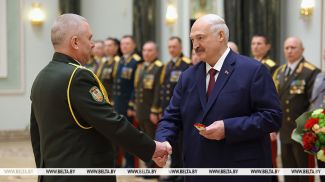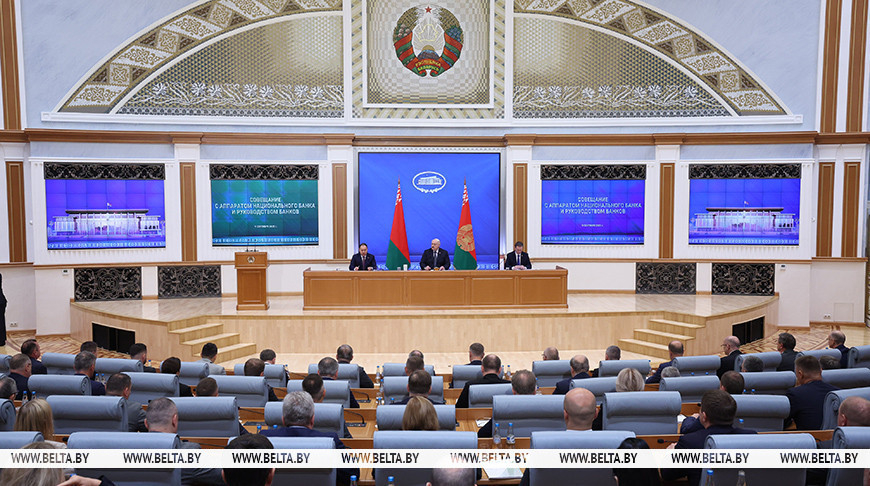
MINSK, 9 September (BelTA) - Belarusian President Aleksandr Lukashenko convened a meeting with the management of Belarus' National Bank and the heads of commercial banks on 9 September to outline key areas and priorities for the country’s banking and financial system, BelTA has learned.
The head of state noted that when appointing Roman Golovchenko as Chairman of the Board of the National Bank, he spoke of his intention to meet the team this year. Today, Aleksandr Lukashenko is fulfilling his promise. Especially since the composition of the board has been substantially renewed, and meetings with the teams of the largest bodies of the state vertical to synchronize positions and define tasks have become regular. Thus, a meeting has been recently held with the Belarus President Administration and diplomatic corps. A meeting with the government is ahead.
The topic of today’s meeting was not only the performance of the National Bank but also the development of the banking and financial system in general, which, like the entire country, is going through a challenging period.
On a challenging period, the battle for hearts and minds, and the cost of sovereignty
“Over the past five years, the national economy, and with it the Belarusian banking sector, have faced unprecedented challenges,” the head of state stressed. He stated that unprecedented, draconian sanctions had been introduced against Belarus.
“They waited for us to fall to our knees. But today we can say (perhaps even with confidence): we are not bankrupt, we have managed. Yes, it was difficult. It is still difficult. It is unlikely to get any easier going forward,” Aleksandr Lukashenko said.
It is precisely in this way, according to the president, that states pursuing an independent policy pay for their sovereignty in the modern world. In this sense, Belarus has learned a great deal and continues to learn.

“After all, various threats have not gone away; the struggle for influence, resources (including financial ones), and minds is becoming increasingly harsh and unpredictable. We continue to fight for peace, stability, and the confidence of our people in the future,” the Belarusian leader said.
On shortcomings that need to be addressed
The head of state noted that, overall, the situation in the monetary sector and the foreign exchange market does not raise concerns. However, there are certain shortcomings that need to be addressed.
In particular, Aleksandr Lukashenko mentioned complaints from Belarusian citizens about banks: instances where old dollar bills are refused, or where insurance services are forced upon customers.
“Let us agree that, as from 1 January 2026, any such instances will automatically lead to disciplinary action against the head of the bank,” the president emphasized. “It is unacceptable to mistreat people with these invented pretexts. There is no need to show that you are smarter than others.”
The president also drew attention to the fact that bank profits are sometimes used for purposes other than intended, and such facts are revealed during inspections.
It happens that credit brokers work undercover, just like spies: they provide computer services, credit history decryption services.
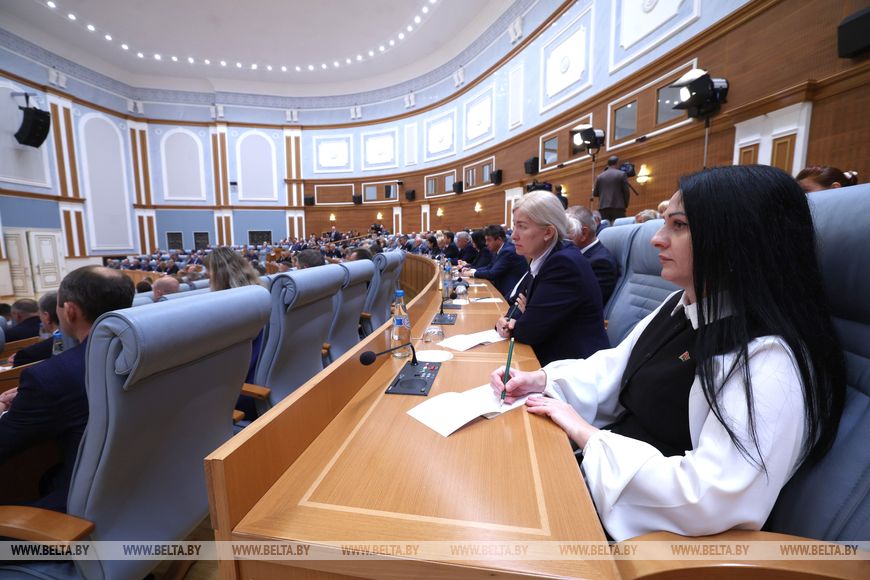
“Rising commission fees charged by banks also remain uncontrolled for now. One must strive for benefit through fairly. One cannot think exclusively in terms of profit,” Aleksandr Lukashenko stressed. “Do not forget that we have about 2.5 million pensioners in the country. About 2 million people live in rural areas.”
“Has the National Bank loosened its grip on regulating bank earnings?” the head of state asked.
Furthermore, the issue of protecting the citizens’ interests when issuing mortgage loans to individuals remains unresolved. There are known cases where people practically ended up on the street after taking out such a loan, the president mentioned.
“There are gaps in the regulation of leasing services,” he continued. “Leasing companies evade restrictions on the size of advance payments and reserve the right to unilaterally change the size of payments. We must put an end to this.”
Among the shortcomings, the president also outlined problems with conducting cross-border payments.
“In addition to the challenges of navigating international payment routes, there is an organizational problem when enterprises are forced to find their own settlement solutions. With such a huge staff at the National Bank – and you have more than 660 people which is three Belarusian governments – can’t you allocate a team for this task?” Aleksandr Lukashenko said.
According to him, facts of internal and external fraud in the banking system are also revealed during inspections. “Criminal cases have been initiated against bank owners for tax evasion, for evading duties,” the president cited examples. “Crimes related to the illegal obtaining of loans based on documents containing false information are systematically identified.”
The head of state warned that such things are utterly unacceptable. “Banks and non-bank credit financial institutions must be honest, operate exclusively in compliance with the law, in the interests of the people and the country.”
“Has the National Bank loosened its grip on regulating bank earnings?” the head of state asked.
Furthermore, the issue of protecting the citizens’ interests when issuing mortgage loans to individuals remains unresolved. There are known cases where people practically ended up on the street after taking out such a loan, the president mentioned.
“There are gaps in the regulation of leasing services,” he continued. “Leasing companies evade restrictions on the size of advance payments and reserve the right to unilaterally change the size of payments. We must put an end to this.”
Among the shortcomings, the president also outlined problems with conducting cross-border payments.
“In addition to the challenges of navigating international payment routes, there is an organizational problem when enterprises are forced to find their own settlement solutions. With such a huge staff at the National Bank – and you have more than 660 people which is three Belarusian governments – can’t you allocate a team for this task?” Aleksandr Lukashenko said.
According to him, facts of internal and external fraud in the banking system are also revealed during inspections. “Criminal cases have been initiated against bank owners for tax evasion, for evading duties,” the president cited examples. “Crimes related to the illegal obtaining of loans based on documents containing false information are systematically identified.”
The head of state warned that such things are utterly unacceptable. “Banks and non-bank credit financial institutions must be honest, operate exclusively in compliance with the law, in the interests of the people and the country.”
On banks’ traditional roles, with price stability coming first
A separate section of the president's address at the meeting concerned the main tasks facing the domestic banking and financial system. According to the head of state, they are fairly traditional, and it is unlikely that any new directions can be discovered here, which, however, does not make them any less significant.
The president emphasized that the primary task for the National Bank and the entire system is maintaining price stability.

As of now, the year-on-year growth rate of consumer prices compared to July 2024 has already reached 7.4%. In August, inflation decreased by 0.3% but still exceeds the annual target of no more than 5%.
“The trend of rising inflation must be reversed,” the head of state urged. “The role of the National Bank in this process is still barely visible so far. We need stable, predictable financial environment for businesses and the population.”
“Low inflation is needed by our enterprises for planning long-term investments. And for people - so that their purchasing power does not fall and their incomes and savings are not devalued,” Aleksandr Lukashenko explained.
On financial stability and the appropriate use of reserves
One of the most important indicators, including those characterizing the level of economic security of the state, is the volume of gold and foreign exchange reserves. As of 1 September 2025, they were estimated at nearly $12.5 billion, having increased by almost $5 billion since the beginning of the current five-year period.
“I would like to note that this was largely attributed to the growth of world gold prices. And this does not always happen. This means that we cannot slow down. And it is probably wrong to just rely on the ‘piggy bank’. The money should work being invested in projects that benefit the country (with a quick return) or long-term export contracts,” the president said.
Aleksandr Lukashenko set the task of maintaining gold and foreign exchange reserves at a level sufficient for stable economic operation during the next five years. “Therefore, we need to skillfully develop and, if necessary, recalibrate our strategy for managing international reserve assets,” the president said.
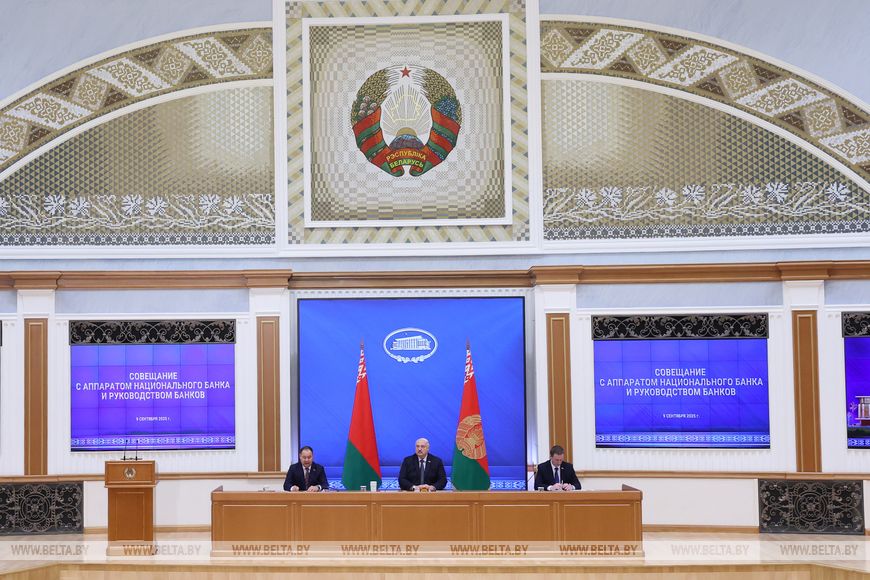
He emphasized that while control of the currency market is paramount, it is equally critical to prevent excessive volatility in the national currency’s exchange rate.
“Banks, non-bank financial institutions, and the payment system must all execute their functions with competence and precision. Your task is to guarantee safe and uninterrupted payments and settlements. The National Bank should maintain the strictest oversight. It’s necessary to act proactively to minimize any risks to the seamless operation of the banking and payments market,” the Belarusian leader noted.
Aleksandr Lukashenko recalled the technical failure on 9 July, which mistakenly debited funds from some Belarusian cardholders. “While you fixed the issue within 24 hours, the incident affected public trust. This should not happen again. It is necessary to identify the root cause to prevent future occurrences. Furthermore, the public must be notified clearly and in due time of any planned technical work,” the president said.
On financial support for the economy from banks
One of the tasks the head of state set for the National Bank and the entire banking system is financial support for the economy. The Belarusian president noted that lending has always been vital for business operations, particularly when it needs to modernize, scale up the business, or create new production facilities.
“The demand for credit resources in our country is traditionally high. Since the beginning of the current five-year period, the annual lending by banks to economic entities and the population has doubled,” Aleksandr Lukashenko emphasized. “At the same time, there has been a decline in the share of bank loans (borrowings) used for fixed capital investment, falling from 27% in 2014 to 12% in 2024.”
According to him, a significant share of these funds is directed toward credit support for the real economy. Over the seven months of this year, legal entities received Br103 billion in credit funds from banks.
“However, the task of financing the economy has not yet been fully accomplished. And it is not the quantity but the quality of financial investments that matters. Every invested ruble must yield maximum returns. This is a guiding principle for absolutely everyone,” the head of state said.
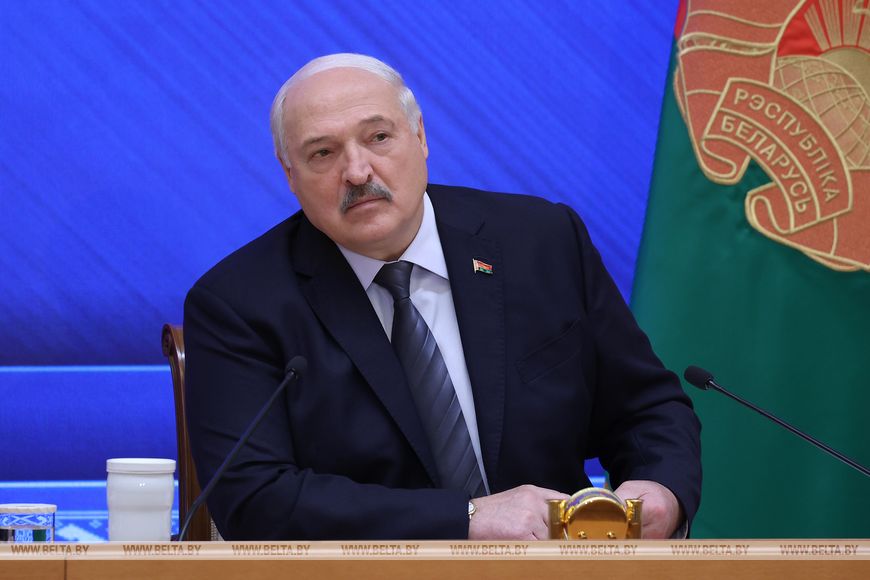
The president emphasized that the banking system must actively contribute to this by ensuring the efficient and rational allocation of resources in the economy. “Financing effective investment projects with high export potential, aimed at import substitution or regional development, must be an unconditional priority for our banking sector. Sometimes it is necessary to help the client, to advise them on where costs can be reduced,” he added.
“Of course, continuous funding of investment projects requires resources. So, where should these resources come from? The clear priority must be to channel ruble savings into the banking sector,” the Belarusian leader stated.
On assisting enterprises with foreign trade operations
The president tasked the National Bank and the banking system with assisting enterprises with foreign trade operations in every way. Several areas of efforts were mentioned. Among those Aleksandr Lukashenko mentioned the expansion of the corresponding bank network in friendly countries and neutral ones and the organization of transactions in national currencies of the countries, which are Belarus’ main trade partners.
Aleksandr Lukashenko stressed: “However odd it may sound but the government and the National Bank have been unable to come to terms on how government agencies and enterprises should interact when problem situations with international payments are encountered. Just like in the fable of ‘The swan, the pike and the crawfish’. Everyone pulls the cart of problems in a different direction. It is necessary to rule out the possibility of any financial losses for the country. Foreign currency proceeds need to be received in full.
The president also drew attention to the need to use friendly systems for transmitting financial data and determine optimal and efficient schemes for the interaction of participants of transboundary transactions. Apart from that, he noted that efficient alternative transaction mechanisms should be used such as debt assignment, transactions in cryptocurrencies, in cash, and so on.
Apart from that, the president gave instructions to increase the volume of completed foreign trade payments for goods and services: “The current mechanism does not fully accomplish the tasks of prompt completion of international transactions and the return of foreign currency earnings into the country,” Aleksandr Lukashenko stated.
According to the president, in H1 2024 overdue external accounts receivable increased by a third and reached $500 million, which is unacceptable. “Or do you want to hide this problem under the rising gold and foreign exchange reserves? Let me remind you that the prosecutor general is in charge of overseeing the return of export proceeds. And the State Control Committee is not far behind. I look forward to principled evaluations from them,” the head of state said.
On accelerated pace of de-dollarization
“The de-dollarization of the economy is proceeding at an accelerated pace. The share of the ruble component in the broad money supply has increased from 41% in December 2020 to 63% in July 2025. Simply put, since the start of 2025, people have been selling an average of $30 million in foreign cash every day,” the president said.
“When people trust the state, they bring their money to the bank. It should be noted that some good results have been achieved lately. Since 2021, time deposits in Belarusian rubles by legal entities and individuals have almost tripled,” Aleksandr Lukashenko stated.
The Belarusian president emphasized that special attention must be paid to the formation of long-term resources. He added that banks should prioritize attracting funds for a period of over three years.
“It is necessary to build a system of work to attract such resources on the most attractive terms for our citizens. This may require new and bold solutions. I believe there is room for improvement here,” Aleksandr Lukashenko said.
“When people trust the state, they bring their money to the bank. It should be noted that some good results have been achieved lately. Since 2021, time deposits in Belarusian rubles by legal entities and individuals have almost tripled,” Aleksandr Lukashenko stated.
The Belarusian president emphasized that special attention must be paid to the formation of long-term resources. He added that banks should prioritize attracting funds for a period of over three years.
“It is necessary to build a system of work to attract such resources on the most attractive terms for our citizens. This may require new and bold solutions. I believe there is room for improvement here,” Aleksandr Lukashenko said.
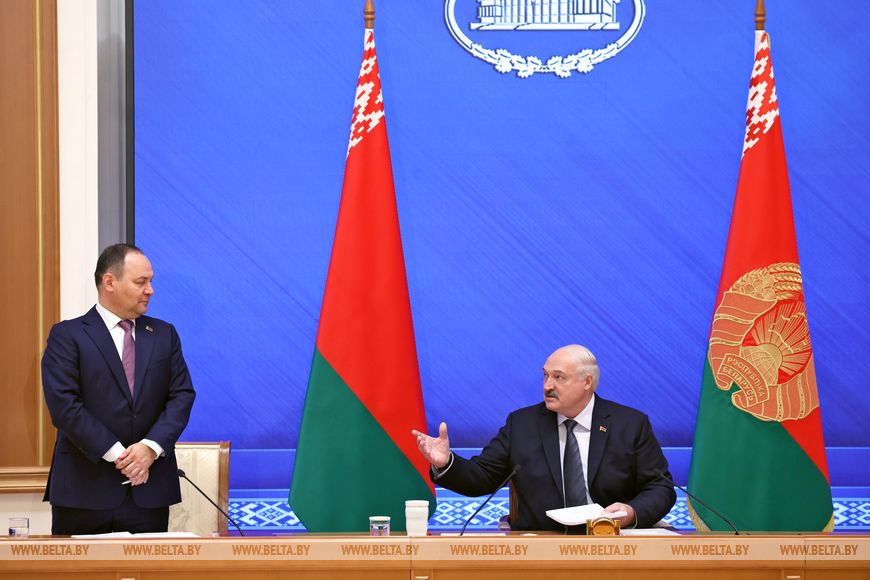
At the same time, the head of state pointed out, other sources should not be forgotten, like attracting foreign capital, and internal resources, including profits. “And the banking system receives quite good profits. But they must be managed responsibly. This money should not be squandered or channeled entirely into annual bonuses for top managers but must instead be returned to the economy,” the head of state stressed.
In this regard, the president instructed that they be directed towards financing economic development – primarily to projects that create added value.
“The regulator must ensure all conditions are in place for banks to freely build up their resource base to the necessary levels. The amount of money in the country must correspond to the real needs of the economy and not lead to price growth. In this connection, the task of the National Bank is to strengthen control over the money supply,” the Belarusian leader said.
In this regard, the president instructed that they be directed towards financing economic development – primarily to projects that create added value.
“The regulator must ensure all conditions are in place for banks to freely build up their resource base to the necessary levels. The amount of money in the country must correspond to the real needs of the economy and not lead to price growth. In this connection, the task of the National Bank is to strengthen control over the money supply,” the Belarusian leader said.
On setting up financial-industrial groups
“In order to attract additional resources into the economy for the implementation of investment programs, it is advisable for the National Bank, with the participation of banks and state bodies, to work out the issue of possible economic integration of financial and industrial capital through the development of financial-industrial groups,” Aleksandr Lukashenko said.
The head of state recalled that Belarus has “repeatedly approached” the idea of setting up such groups. A decree was adopted in 1995, and a special law in 1999, which, according to the president, came to nothing by 2012.
“The setting up of financial-industrial groups will contribute to the formation of a new investment system, a more efficient use of the financial assets of banks as potential investors,” Aleksandr Lukashenko believes.
He emphasized that not only banks but also non-bank credit and financial organizations should be more actively involved in financing investments, and they should introduce new financial support instruments. The main criterion in this case is the growth of their share in GDP.
“By the way, we had an experiment when Belarusbank received shares of Belshina. Well, what about the result? With tire exports down by 20%, it's hard to call the experiment a success. Please report on this today,” Aleksandr Lukashenko added.
On expanding the use of digital tokens
At the meeting, the Belarusian president set the task to expand the scope of application of digital tokens, which is one of the most important areas of the digital development of the national economy.
According to him, the use of tokens in the financial sector helps to minimize the presence of intermediaries, automate the execution of transactions through smart contracts, and enhance users’ control over their assets.
“Today, cryptocurrency-based transactions are more active than ever, and their role in facilitating payments is growing. In the seven months of this year, the volume of external payments through cryptocurrency exchanges amounted to $1.7 billion. According to expert estimates, it may reach $3 billion by the end of the year,” the head of state said.
The Belarusian president emphasized that a market of this magnitude requires transparency, effective regulation, and reasonable control. “The government and the National Bank have been given corresponding instructions. Now, act,” the head of state added.
According to him, the use of tokens in the financial sector helps to minimize the presence of intermediaries, automate the execution of transactions through smart contracts, and enhance users’ control over their assets.
“Today, cryptocurrency-based transactions are more active than ever, and their role in facilitating payments is growing. In the seven months of this year, the volume of external payments through cryptocurrency exchanges amounted to $1.7 billion. According to expert estimates, it may reach $3 billion by the end of the year,” the head of state said.
The Belarusian president emphasized that a market of this magnitude requires transparency, effective regulation, and reasonable control. “The government and the National Bank have been given corresponding instructions. Now, act,” the head of state added.
On active introduction of digital payment technology
Aleksandr Lukashenko also urged to intensify the adoption of digital payment systems. “We have made a start with QR codes. An instant payment system should be launched no later than year’s end. This will give our people a faster, simpler way to pay for goods and services,” the president said.
Furthermore, Aleksandr Lukashenko noted that the system will, for the first time, allow Belarusian businesses to do credit transfers in real-time, even on weekends and holidays.
He underscored the significant operational benefits: “This enhances fund turnover, guarantees accessible liquidity, and minimizes cash gaps for organizations. These are substantial advantages.”
According to the president, breakthroughs in mobile technology and vastly improved communication services have allowed banks to adopt innovative digital products. These tools have not only transformed traditional banking but have also made remote bank-client relationships the new standard. “I have consistently stated that the world is rapidly evolving, with technology advancing at a cosmic pace. Victory belongs to those who can first harness these innovations and foresee the future. Therefore, banks must intensify their efforts to integrate AI-based solutions. This is essential for boosting operational efficiency and reallocating human capital to tackle more complex, strategic challenges,” Aleksandr Lukashenko is confident.
The president emphasized that, in line with global banking trends, the digital strategy must prioritize key areas: adopting biometric technologies and establishing a dedicated IT company to reduce heavy reliance on external service providers. He also stressed the need to create corporate universities that will train future banking specialists from their student years, focusing on interdisciplinary expertise.
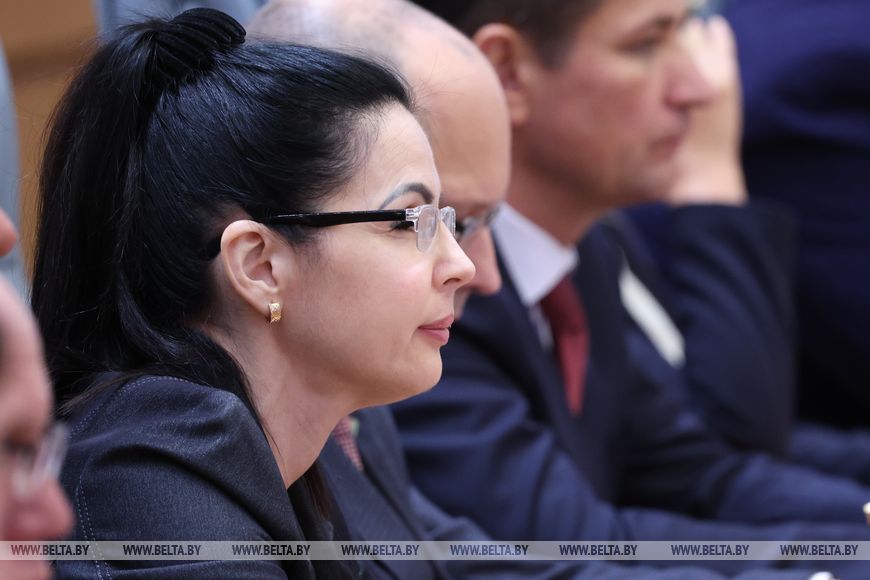
“Banks must try to make the most of modern technology. Digitalization is not an end in itself; it must deliver tangible economic results,” he added.
On preventing fraud
The president went on saying that this digital push must be matched by vigorous information security efforts. “As practice shows, individuals often inadvertently provide fraudsters access to their accounts. Therefore, banks must scale up public awareness campaigns on both common and emerging cybercrime tactics, as well as concrete prevention measures,” Aleksandr Lukashenko instructed.
The head of state mandated that banks must more aggressively pursue and deploy domestically developed cybersecurity tools adapted to local market needs.
“Furthermore, the National Bank must enhance its supervisory role by placing increased emphasis during examinations on evaluating cyber risks, information security vulnerabilities, and the adequacy of measures taken to protect client personal data and banking secrecy,” the Belarusian leader said.
On key performance assessment indicator for the banking sector
“The purpose of this meeting is to emphasize my principal demand for the banking sector. If the economy is growing and there are no issues with settlements, it means that you are doing your job well. Conversely, without economic growth, discussions about gold reserves or currency volatility are meaningless. The economy is the ultimate indicator,” the president said.
The head of state confirmed his general support for the concept of the forthcoming five-year socio-economic development program, which is currently in active development. “The plan must include concrete measures to bolster the National Bank’s role as a key driver of economic growth,” he said.
Aleksandr Lukashenko went on saying that the current National Bank Chairman, Roman Golovchenko, had previously advocated for the deeper integration of the National Bank and the banking system into the national economy during his tenure as Prime Minister.
“Now, as head of the National Bank, you must work in lockstep with the current Prime Minister, Aleksandr Genrikhovich [Turchin]. Your goals are aligned: driving economic growth, ensuring public welfare, and containing prices,” the president emphasized.
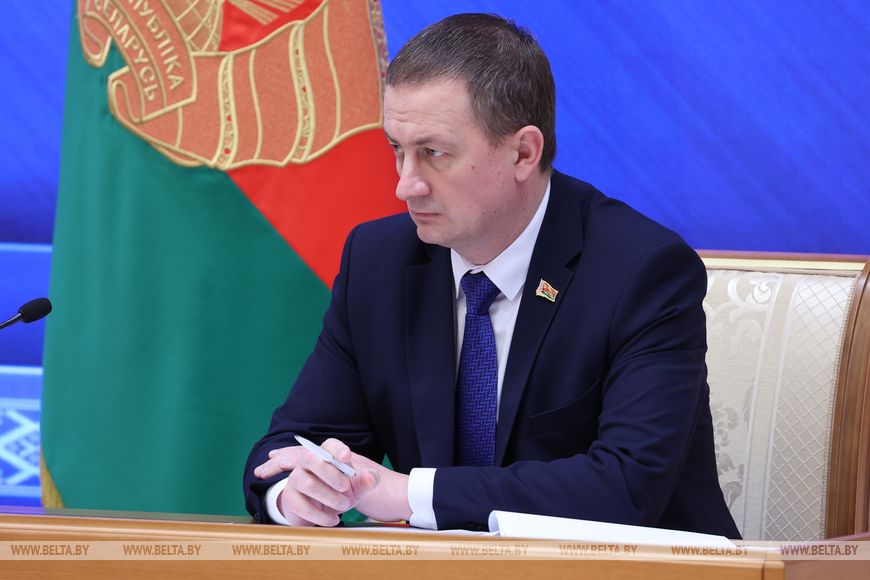
He acknowledged the banking sector’s challenging yet stable condition, saying: “Well done. You withstood a targeted blow to the banking system without wavering, and you found ways to operate actively despite complex foreign economic pressures. Overall, your performance is commendable, and I appreciate your work. But the most critical task is to never become complacent.”






